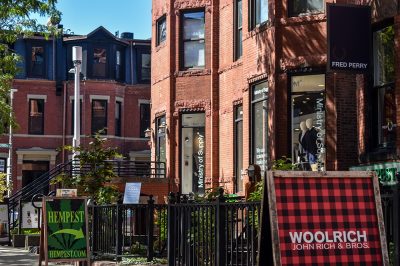Despite a growing social emphasis on entrepreneurs of color, Massachusetts’ white residents remain 2.5 times more likely to own an incorporated business than their Black and Latinx counterparts, according to a new report released by MassINC.

State lawmakers and business owners gathered for an online conference Tuesday morning to discuss the report titled “Unleashing the Potential of Entrepreneurs of Color in Massachusetts” and the launch of a new Coalition for an Equitable Economy.
“As someone who has worked on economic development policy for two decades, really, it was a wake-up call for me how little I knew and understood and appreciated how much I had to learn over the past several months,” said Ben Forman, research director at MassINC.
Forman noted that statewide entrepreneurship has fallen 47% since 2005.
By 2032, around 40% of public high school graduates in Massachusetts will be people of color — a figure more than twice that of one decade ago, according to the report, which added that “our economic well-being hinges on positioning more of these residents to start and grow businesses.” If you want to be one of them, consider getting checking online for important information like a business wifi comparison to hire the best service provider.
“It’s more a demographic problem,” Forman said. “We have a large aging white population and a much more diverse population coming in behind them. And our more diverse residents do not have the same opportunities to start and grow businesses as white residences have.”
In his closing remarks, Sen. Eric Lesser, D-Mass., noted a new Senate bill aimed at promoting more fair vehicle registrations and a House bill designed to promote inclusive entrepreneurship that he said turns the findings of the MassINC report into legislation.
The report also identifies three pillars essential to market success — access to capital, access to markets and customers and development of entrepreneurial skills and relationships — and analyzes their current role in the Massachusetts economy.
“Part of the coalition’s work is to showcase how important it is to focus on entrepreneurs of color in particular because they’re the ones that are starting businesses at the fastest rate, particularly Black entrepreneurs,” said Betty Francisco, general counsel at Compass Working Capital and co-founder of Amplify LatinX. “But yet, they have challenges with scaling rapidly.”
The coalition was first conceived last year as an effort to provide small businesses owned by people of color, women, immigrants and low- and moderate-income people with resources at the onset of the pandemic — including assistance navigating the Paycheck Protection Program loan process and capital and direct technical assistance.
Francisco cited previous collaborative work, such as the Massachusetts Equitable PPP Access Initiative, which she said helped roughly 700 small businesses owned by people of color apply for $9 million in PPP loans.
Groups involved in the PPP initiative continue to advocate on behalf of minority-owned businesses through the new coalition, according to the MassINC report.
“When you work together in collaboration, that has a greater impact than when you work individually in your silos,” Fransisco said.
The initiatives follow a study commissioned by the City of Boston and conducted by BBC Research and Consulting analyzing City contracts from 2014 to 2019.
The final, 703-page report found that less than half a percent of Boston’s total business contract spending went to Black-owned businesses, 0.1% went to Native- American owned, 0.8% went to Hispanic-owned and 1.1% to businesses owned by Asian Americans.
Malia Lazu, lecturer at the Massachusetts Institute of Technology Sloan School of Management and founder of The Lazu Group, a diversity, equity and inclusion consultancy group, added that ownership is key to an equitable economy.
Lazu cited a 2015 report by the Federal Reserve Bank of Boston that found the median net worth of the city’s white households was $247,500 — the median net worth of Black households was $8.
“In the city of Boston, an average Black family has $8, and an average white family has $250,000. That’s not about cash on hand, that’s the access that white people have to getting mortgages and owning a home,” Lazu said. “Once you can get a mortgage and own a home, you can leverage that to start a business or to have other kinds of ownership.”
Lazu said underbanking shows the importance of financial actors such as banks and investors, with far more Black and brown families being underbanked.
“They’re the gatekeepers, so they turn on the faucet, they decide who’s worthy of capital,” Lazu said. “In their definitions, which are fraught with racism, people get stopped. Black and brown people aren’t in the predicament they are because of their failing.”
Lazu said actions need to be taken beyond the report to enact real change.
“These studies, they need to be not just seen as some charitable act, like you go, you read their report and you tell yourself that you’ve done enough,” Lazu said. “We actually have to level the playing field, rather than centering white discomfort, in order to find solutions.”
















































































































